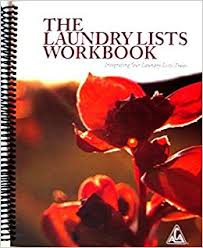The organization, Adult Children of Alcoholics (ACA) has been around for several decades now. I heard about them when the organization gathered momentum, maybe 25 years ago. I never got involved; I guess I was not ready back then.
One of the most shocking things a new person on the ACA journey discovers is the Laundry List. The list is a summary of the traits that are common in ACA people:
- Fear people and authority figures
- Become approval seekers
- Be frightened of angry people
- Be terrified of personal criticism
- Become alcoholics, marry them, or both
- View life as a victim
- Have an overwhelming sense of responsibility
- Be concerned more with others than themselves
- Feel guilty when they stand up for themselves
- Become addicted to excitement
- Confuse love and pity
- “Love” people who need rescuing
- Stuff their feelings
- Lose the ability to feel
- Have low self-esteem
- Judge themselves harshly
- Become terrified of abandonment
- Do anything to hold on to a relationship
- Become “para-alcoholics,” people who take on the characteristics of the disease without drinking
- Become reactors instead of actors
After seeing this list and identifying with so many of the traits, I read that each one of us not only has these issues but often the “reverse” of the traits. The article, “The Other Laundry List” explains what this is more clearly then I can:
All of the “14 Traits have an opposite. Our experience shows that the opposites are just as damaging as the counterpart. For example, if we feared authority figures, as the first trait suggests, we also became authority figures to our children, spouses, or others. When we stop and think about it, we realized we were feared as authority figures. If we lived our life from the viewpoint of a victim (Trait 5), then many of us have become persecutors or perpetrators who created victims. If we got guilt feelings for standing up for ourselves (Trait 7), we could also feel guiltless by shaming someone verbally. We could take from others what was not ours without feeling guilty.”
 See how that works? Each trait has two sides and many of us show both sides of a trait. That is where all this gets scary. If you are doing the math, that means that one ACA can have 28 possible defects to work through as a result of growing up in an alcoholic home. And, we read that list at the beginning of every meeting, which drives home the reality of those defects. Talk about dropping the rose-colored glasses and putting on the shit-colored ones! We start out on such a heavy note, almost shaming, and, if we are not careful, we could learn to see ourselves as nothing more than a wad of those traits. It feels like a life sentence sometimes.
See how that works? Each trait has two sides and many of us show both sides of a trait. That is where all this gets scary. If you are doing the math, that means that one ACA can have 28 possible defects to work through as a result of growing up in an alcoholic home. And, we read that list at the beginning of every meeting, which drives home the reality of those defects. Talk about dropping the rose-colored glasses and putting on the shit-colored ones! We start out on such a heavy note, almost shaming, and, if we are not careful, we could learn to see ourselves as nothing more than a wad of those traits. It feels like a life sentence sometimes.
To keep from being overwhelmed, I am training myself to look at the Laundry List as the behaviors and beliefs that I learned and not the ultimate definition of who I am. This is really important for me. If I am not, at my very core, those things that I pretended to be, then I sure as heck am NOT defined by all of the behaviors that I may act out because of my upbringing. There is something okay that sits in between these extremes.
And then, there is this question: do we need to work through all of those traits to become whole? What is the goal here after we learn to be vulnerable and let this stuff in? Are we after a “cure”? Or is it simpler, like just becoming aware of the traits and trying to do a better job at life? I have found snippets of an answer here and there, including the goals of developing new coping mechanisms and ultimately moving to a place of compassion and kindness towards others. The rest of the answer is in the Promises of ACA Recovery, which we read at the end of the meeting. Whew! At least we get to depart in hope after all the heavy stuff!
Recovery, Dictionary.com
noun
an act of recovering.the regaining of or possibility of regaining something lost or taken away.restoration or return to health from sickness.
The Promises of ACA Recovery
1. We will discover our real identities by loving and accepting ourselves.
2. Our self-esteem will increase as we give ourselves approval on a daily basis.
3. Fear of authority figures and the need to “people-please” will leave us.
4. Our ability to share intimacy will grow inside us.
5. As we face our abandonment issues, we will be attracted by strengths and become more tolerant of weaknesses.
6. We will enjoy feeling stable, peaceful, and financially secure.
7. We will learn how to play and have fun in our lives.
8. We will chose to love people who can love and be responsible
for themselves.
9. Healthy boundaries and limits will become easier for us to set.
10. Fears of failures and success will leave us, as we intuitively make healthier choices.
11. With help from our ACA support group, we will slowly release our dysfunctional behaviors.
12. Gradually, with our Higher Power’s help, we learn to expect the best and get it.
Goal: Take it slow! Pick just a couple of the traits to work on.
I am moving today so I probably won’t post anything for a few days. As I drive, however, I will be thinking about all this and maybe getting some new insights. In the meantime, I have scheduled some RV maintenance posts.
My little buddy, Tango, has his winter coat on! Just in time. 





Moving is very hard work – the advice I’ve read say it is one of life’s hardest jobs. Good luck with your change. I hope it finds you in a perfect spot – one with sunny days for walking, pleasant neighbors, nearby library, and good fresh produce. I was just about to write I too will be away for awhile; a family member passed away and going to a celebration of his life involves some travel.
While you are moving, think about a female cousin about the same age as you having play dates at your maternal grandmother’s who truly loved her grandchildren. mah
Travel safely! Moving with the RV is not so bad. Don’t really have to pack, just hitch her up. Will you be near WA? I only have q memory of Grandma Henderson. She was sick and Grandpa H chastised her for not using a kleenex more than one time. I have good memories of him but he must have been an oppressive father. I need to call you and get family stuff. I don’t have your number though.